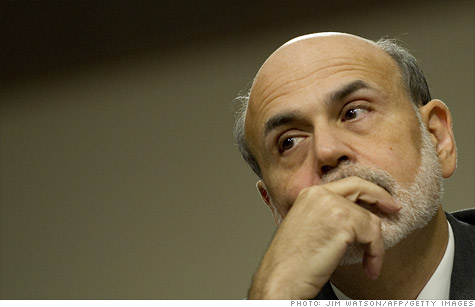Search News

Fed chief Ben Bernanke is worried about European debt problems spilling over to the U.S. economy. Most experts surveyed by CNNMoney say that the European debt crisis could be the catalyst for the Fed to launch QE3 in 2012.
NEW YORK (CNNMoney) -- Debate over whether the Federal Reserve would pull the trigger on QE3 started even before QE2 ended last summer.
Now, six months later, the verdict is still out, but most of the investment experts surveyed by CNNMoney largely agree on one thing: the U.S. economy will have to get worse before Fed chief Ben Bernanke will even consider launching yet another round of asset purchases, a policy known as quantitative easing or QE.
At this point, the outlook is murky.
Those who say QE3 is out of the question cite the quietly improving U.S. economy: including an unemployment rate that ticked below 9% for the first time in two-and-a-half years in November, and renewed signs of strength in manufacturing activity.
But of the nearly 75% of those surveyed that say QE3 may be in the cards in 2012, more than half point to Europe's raging debt crisis as the primary catalyst.
"Despite an improving tone to recent U.S. economic reports, we are concerned that global developments may weigh more heavily on the U.S. growth outlook as 2012 unfolds," said Dan Pierce, portfolio manager at State Street Global Advisors.
Even Bernanke is worried about European sovereign debt problems spilling over to the U.S. economy. In November, the Fed took steps along with five other top central banks to make it cheaper for banks around the world to borrow U.S. dollars, in an effort to put an end to Europe's crisis and stabilize global financial markets.
If Europe's problems can be contained, with the worst outcome being a mild and short-lived recession in Europe, the Fed will likely hold off on starting up the printing presses again.
"The Fed is already using all of the tools at its disposal to stem the crisis," said Doug Cote, chief market strategist at ING Investment Management. "QE3 or bond buying of both U.S. banks debt and European bank debt remains a powerful tool but will only be used as a last resort."
If the Fed does in fact go ahead with a third round of asset purchases, experts say that rather than buying long-term Treasuries as it did in QE2, the central bank will concentrate its purchases on mortgage-backed securities to drive down mortgage rates, which are already at record lows below 4%, and support the housing market, said Tyler Vernon, chief investment officer at Biltmore Capital.
Though the Fed's decision hinges on how things pan out in Europe, experts also say that time for the Fed to act is running out.
If QE3 hasn't been announced by the summer, don't count on it, said Peter Tuz, president at Chase Investment Counsel. Cutting into the latter half of the year, the Fed will likely take the sidelines to appear politically impartial ahead of November's critical election, he added. ![]()
| Index | Last | Change | % Change |
|---|---|---|---|
| Dow | 32,627.97 | -234.33 | -0.71% |
| Nasdaq | 13,215.24 | 99.07 | 0.76% |
| S&P 500 | 3,913.10 | -2.36 | -0.06% |
| Treasuries | 1.73 | 0.00 | 0.12% |
| Company | Price | Change | % Change |
|---|---|---|---|
| Ford Motor Co | 8.29 | 0.05 | 0.61% |
| Advanced Micro Devic... | 54.59 | 0.70 | 1.30% |
| Cisco Systems Inc | 47.49 | -2.44 | -4.89% |
| General Electric Co | 13.00 | -0.16 | -1.22% |
| Kraft Heinz Co | 27.84 | -2.20 | -7.32% |
| Overnight Avg Rate | Latest | Change | Last Week |
|---|---|---|---|
| 30 yr fixed | 3.80% | 3.88% | |
| 15 yr fixed | 3.20% | 3.23% | |
| 5/1 ARM | 3.84% | 3.88% | |
| 30 yr refi | 3.82% | 3.93% | |
| 15 yr refi | 3.20% | 3.23% |
Today's featured rates: